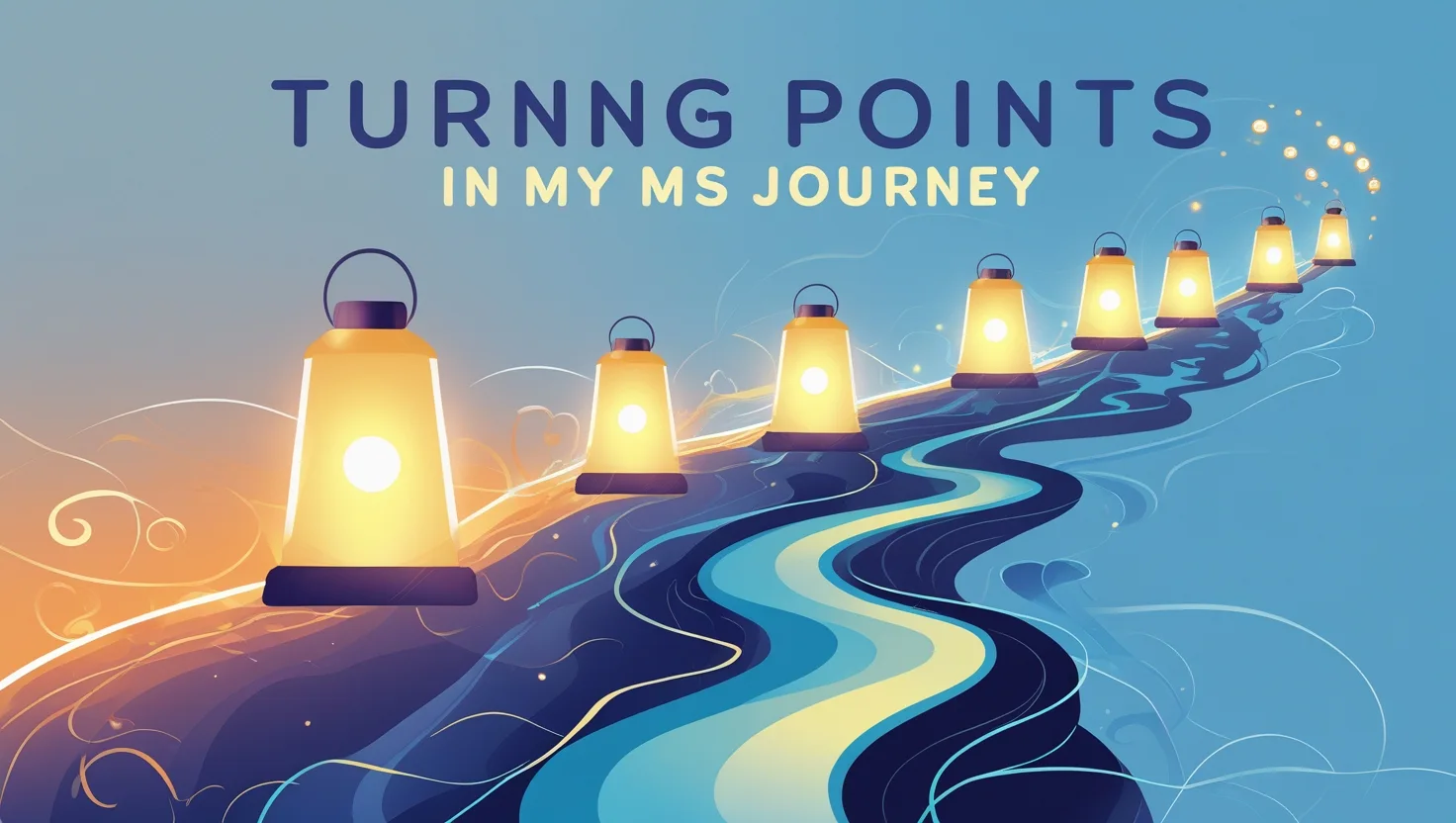Living with MS can feel like navigating uncharted territory—every turn brings new challenges, unexpected detours, and moments of both struggle and growth. When I was first given my MS diagnosis, I had no idea what to expect. I just knew that life would be different. But what I didn’t realize at the time was that along this unpredictable MS journey, I would also encounter surprising moments of strength, clarity, and even joy.
This article isn’t about setbacks or symptoms. It’s about the turning points—the moments that shifted my perspective, gave me hope, and helped me find a stronger footing while coping with MS. These five positive milestones haven’t erased the hard days, but they’ve reshaped how I live with multiple sclerosis and how I view myself within it. If you’re on your own journey, I hope something here resonates or reminds you that support, progress, and peace are possible—even in the most uncertain of times.
Finding the right multiple sclerosis support can make a world of difference when it comes to coping with MS, whether that’s through community, treatment, or simply knowing you’re not alone.
Table of Contents
ToggleTurning Points in My MS Journey
Turning points aren’t exclusive to living with MS or any other health journey – they’re part of life. Sometimes they arrive with a bang, like a life-changing phone call or a sudden decision. Other times, they sneak up on us through quiet realisations, small acts of courage, or a shift in how we see the world.
What makes a turning point powerful isn’t just the event itself, but how it changes the direction we’re heading. In the context of MS, these shifts might be sparked by a new treatment, a meaningful conversation, or even a simple moment of acceptance. But the idea is universal: we all experience forks in the road where things begin to transform—internally, externally, or both. And when we look back, those moments often mark the places where we grew the most.
Accepting My Diagnosis – On My Terms
It’s quite normal, or so I believe, to go through a period of denial after receiving an MS diagnosis. I was no different. For a time, I truly convinced myself that the numbness in my hands and face was caused by something simple – like a trapped nerve.
This belief took root after my wife began seeing a homeopathic chiropractor who was convinced he could free trapped nerves using the power of his hands. With just a gentle press on the right spot, he claimed he could release tension and restore function. It might sound like mumbo-jumbo, and to be honest, I was sceptical too. But his track record was surprisingly compelling. People paid for him to travel across the world to treat valuable animals—horses, pigs, even sheep. And time after time, they claimed to see results.
For a while, on this MS journey, I clung to the hope that this was my answer too. But eventually, as the symptoms lingered and new ones began to emerge, the reality became harder to ignore. Accepting my diagnosis didn’t come all at once – it was a slow, inward process. But when I finally did, I made peace with it on my own terms. That moment wasn’t about giving up – it was about taking back control and deciding that I would face MS head-on, rather than run from it.
This shift in mindset laid the foundation for everything that followed – my approach to treatment, to lifestyle changes, and most importantly, to how I look after my energy and wellbeing. One of the biggest challenges in early multiple sclerosis support was dealing with fatigue. If that’s something you’re navigating too, I’ve written more about it here.
Learning About CIS: Making Sense of the Confusion
My second turning point came through understanding something I’d never even heard of before – Clinically Isolated Syndrome (CIS). After being referred to Aberdeen Royal Infirmary, I underwent a series of tests including an MRI scan and a lumbar puncture. Both showed positive indications that something wasn’t right. But despite the findings, my consultant, Dr Coleman, stopped short of confirming a diagnosis of multiple sclerosis.
At the time, this left me feeling confused and frustrated. How could the tests say one thing, and yet still no diagnosis? How was this knowledge supposed to help me in coping with MS.
Later, I learned that this early phase – when someone experiences a single episode of neurological symptoms— – s referred to as CIS. It’s essentially a warning sign. A diagnosis of MS typically isn’t confirmed until a second, separate episode of symptoms occurs. Learning about CIS gave me a clearer understanding of what was happening in my body and why things were being handled with such caution. It helped me make sense of what felt like a grey area between “you’re fine” and “you have MS.”
This knowledge brought a strange sense of reassurance. It didn’t take away the uncertainty, but it did give me something I could name, research, and come to terms with. And that alone gave me a greater sense of calm and control during a deeply unsettling time.
Coping with this kind of emotional limbo can be incredibly stressful. If you’re in that place now, you might find this article helpful: Managing Stress with Multiple Sclerosis.
When My Legs Gave Out: The Day MS Got Real
The third milestone came with the stark realisation that MS isn’t just physically debilitating – it can also be downright embarrassing.
At the time, I was still working from the office in Dyce. It was a normal day, and as lunchtime rolled around, I felt a bit peckish. I decided to nip out to the local shop for a sandwich. I drove to the nearby village, parked the car just opposite the shop, and stepped out with the simple plan of crossing the road.
But MS had other ideas!
I made it halfway across when, without warning, my legs gave out. Just collapsed beneath me. One moment I was upright, the next I was a crumpled, awkward heap in the middle of the road. It was as undignified as it sounds. My first instinct was to spring up as quickly as I could – not because I was hurt, but because I was mortified. I looked around to see if anyone had seen me stumble, brushed myself off, and carried on to buy my lunch as though nothing had happened.
That moment was a wake-up call. Until then, MS had been more of an internal condition for me – fatigue, numbness, things I could keep to myself. But now, it had spilled out into the open. It was unpredictable. Visible. Real. And it forced me to accept that I needed to treat my body – and this condition – with more care and respect.
One thing I began to focus on after this incident was rest and recovery. Improving sleep, in particular, became a quiet but essential part of managing both the physical and emotional toll of days like that. I’ve shared some of what’s helped me here: Improving Sleep Quality with MS.
Letting Go of My Driving Licence: A Quiet Act of Courage
This fourth milestone was, perhaps, the most life-changing of them all.
MS forced me to relinquish my driving licence – something that had once felt as essential to my independence as breathing. I had worked as a field engineer, often travelling to clients’ premises across the region. Driving wasn’t just a convenience; it was my livelihood.
Following my diagnosis, my doctor advised me that I was legally obligated to inform the DVLA. I did so, and as a result, I was required to undergo regular driving assessments. I passed them. But despite the all-clear on paper, I had growing doubts about my safety behind the wheel.
The real turning point came on a drive back from Glasgow Airport. I was picking up my wife, who’d just returned from a short holiday in Ibiza with a friend. The journey was uneventful on the surface, but partway home she asked why I was so quiet- was I angry with her? I had to admit, no, I wasn’t upset – I was concentrating. Concentrating hard. Because I couldn’t really see.
MS had affected my eyesight without me fully realising it. On top of that, I’d started noticing other worrying signs: mental “blackouts” where I’d drift off into a daze, then snap back with no memory of where I was or how I’d got there. These weren’t just lapses in focus – they were dangerous.
When the time came to renew my licence, I made the decision not to. It wasn’t taken from me. I let it go. It felt like a quiet act of courage – choosing to prioritise the safety of others and myself, even if it meant giving up something that had defined a huge part of my life.
This decision reshaped my lifestyle completely. I had to rethink how I stayed active, connected, and independent. It led me to healthier habits that gave me more stability and clarity in the day-to-day. I share more about that shift in this post: Managing Multiple Sclerosis with Healthy Habits.
Meeting My Mitochondria: A New Way to Understand MS
My fifth and final milestone came from an unexpected place – curiosity. One evening, I asked Google a simple question: “Why are humans warm-blooded?” What followed was a deep dive into biology that would fundamentally change how I understood my experience with MS.
That search led me to learn about mitochondria – the tiny powerhouses within our cells responsible for producing energy and managing cell reproduction. They’re often referred to as the batteries of life, and once I started reading about their role in human health, something clicked.
It was as though a lightbulb went on. The overwhelming, bone-deep fatigue I’d struggled with – the kind that sleep couldn’t fix and others couldn’t always understand – suddenly made more sense. If your cellular batteries aren’t functioning properly, of course you feel drained. Of course your body struggles to bounce back.
A huge part of my understanding came from Dr Terry Wahls and her book, The Wahls Protocol. Her work around mitochondria and MS illuminated so much of what I’d felt but hadn’t been able to articulate. It gave me not only knowledge but a framework to better care for myself – from what I eat to how I think about energy and healing.
This insight became more than just interesting science – it became a source of empowerment. I felt less at the mercy of my condition and more in tune with what was happening at a cellular level.
It also changed the way I think about the future. If you’re wondering what MS means for the long haul, I’ve explored that question further here: Life Expectancy for MS Sufferers.
Conclusion
Looking back, these five turning points haven’t just marked the stages of my MS journey – they’ve helped shape how I live with MS today. From accepting my diagnosis on my own terms to letting go of my driving licence, each moment brought clarity, perspective, and, surprisingly, strength. Understanding CIS, learning to cope with MS-related fatigue and embarrassment, and even exploring the role of mitochondria have all helped me make sense of what felt, at times, like chaos.
Living with MS means constantly adapting, learning, and, when needed, letting go. But it also means discovering new ways to thrive—through healthy habits, stress management, and an ever-deepening understanding of what’s happening inside the body. Resources like this research from Nature have added scientific insight to what I’ve experienced firsthand, especially around fatigue and cellular energy.
Whether you’re newly diagnosed or further along, I hope these reflections help you feel seen—and remind you that your turning points, however small or strange they may seem, are valid parts of the path. Because every MS journey is different, but we’re all walking it together.




